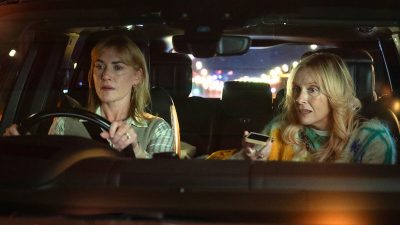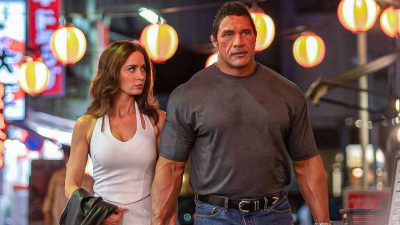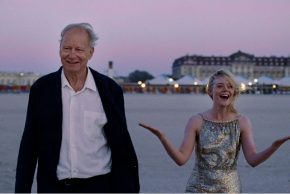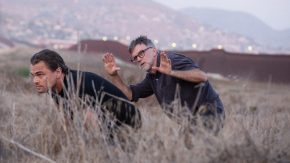It’s a rare moment for me to start an English-speaking interview with a Hungarian joke. Yet I couldn’t help it this time. The joke is about the conscription of new soldiers, with a sergeant shouting: “Line up! Flemish on the right, Walloons on the left!” Then a Hungarian immigrant (in most authentic versions, one of Jewish origin) innocently looks around:
“And where should the BELGIANS line up?”
Cédric Eeckhout, my interview partner, laughs from the heart when I tell him that the punchline of this joke even made it to be an aphorism in Hungary, often quoted as a critique of false dichotomies. But what is an abstraction for most Hungarians is a reality for Eeckhout who is indeed the child of a Flemish man and a Walloon woman. He has been on a constant quest to find out what his bicultural identity, his Belgianness, his Europeanness in fact mean to him, and on this basis he built up a whole show. Not surprisingly, titled The Quest. I asked him some details about it.
Would you consider yourself to be from a mixed marriage?
Not only from a mixed marriage, but from parents who separated when I was five. It’s a very important aspect of both my life and the show. I think everyone has their little traumas, and I believe in the power of analysis. I was raised in Belgium, but yes, one can say that I was raised biculturally. This reflects the situation of Europe so well: the mix of cultures can create attachment, qualities, but also difficulties and problems. So my parents divorced, and I went to the Flemish part of the family once a month. My father’s family spoke French, except for my grandmother with whom I could only communicate with gestures. Back then, it was considered to be a good thing among Flemish families to speak the language of Wallonia, because latter used to be the richer part of the country. But nobody on my mother’s side spoke Flemish though. That was a political problem already. Anyway, the economic situation has changed ever since.
From a young age, I was part of one country but two cultures, and the family didn’t really know how to manage it. It hurt me a lot to see my parents fight and divorce. I grew up in two households, and my cultural background was also shaped by Brussels, the ‘capital of Europe’. Once during an improvisation work, I suddenly realised that my initials, CE, are the same as that of Communauté Européenne (the European Community). I realised more and more how my personal feelings and life events are connected to European politics and international relations. At one point in my life I had to admit that I am in a serious crisis – and it was the same time when experts started to talk about the crisis of the EU. It was astonishing to see these parallels. This show has grown out of this experience.
Sounds like ‘the personal is political’ works very well in your case, doesn’t it?
Totally. The Quest is, on the surface, a lot of fun. It follows some principles of stand-up comedy, but it’s not purely funny. It mixes fact and fiction in various ways.
How do you mean that?
For instance, there are three of us on stage. I play myself and use my real name all along. There is also my real mother who, despite not being an actress, immediately agreed to be part of my show. I wanted her to be in The Quest exactly because she brings a huge amount of reality in it. She is cooking Belgian fries for me on stage, a traditional family dish. And there is my cat Jesus, who really exists, but obviously is not played by a real cat. It’s a human dressed up, usually one of my best friends, sometimes my husband. So there is my real mother and a fake cat. Also, the show depicts me as a single man looking for love and answers for why his previous relationships didn’t work out. As you could have guessed, that’s not the case anymore: I am married now. Yet, the show, with all the fictional elements, is still 70-80% true.
It shows both my own story and the idea of Europe in various ways. For instance, when I was really single, I travelled a lot through Europe and had lovers from many countries. Most of these relationships became difficult due to the physical distance, but also some cultural differences. It is different to be Western or Eastern European, both in an economic and social sense. In the show, I draw parallels between my personal crises and some European ones. For instance, although Brexit was sometimes jokingly compared to a divorce, in the show I tell a story of how the tensions around the referendum could easily have led to the end of a romantic relationship between two people. Or another huge part of the show is my ex-lover from Hungary. For building his character, I used a lot of input from other Hungarian LGBT+ people, too, who told me about the country and how they feel more and more to be depicted as an enemy of the state.
Does this mean that you used other sources than your own story, too?
To be precise, we recorded exactly 87 interviews for this show.
Wow!
Yes indeed. We reached out to our colleagues from all around Europe, asking them to connect us with people, preferably not from the field of theatre and arts. We had some, but the majority were just random people from several European residencies. Young, old, female, male, gay, straight. We asked them a mixture of political and personal questions, for instance about what makes relationships work, how to deal with separations, what makes people go back together after a crisis, how do they spend Sundays with their family, how do they feel about the EU. The result was 50+ hours of video material, and some of it was edited into the play. I mostly used their answers to personal questions, but because the show is about the political domain, too, these personal answers also have multiple layers. Oh, and I also interact with the local audience a bit. Because my dialogue with Europeans about Europe can never end.
How do you feel about coming to Budapest with this show?
I’m very proud as a gay, queer, European person to go to Budapest to perform this show. I have goosebumps saying this. Because I am not only pro-European – in my own critical but idealist way –, I’m also pro-people. This show is about many layers of a person’s identity, and it is very important nowadays to keep sharing our personal histories, whatever they are. This time you can hear a gay man in his early forties, talking about his ideals of solidarity, acceptance, and finding our common roots. You are cordially invited to see The Quest. Yes, even you, dear Prime Minister.

























Comments